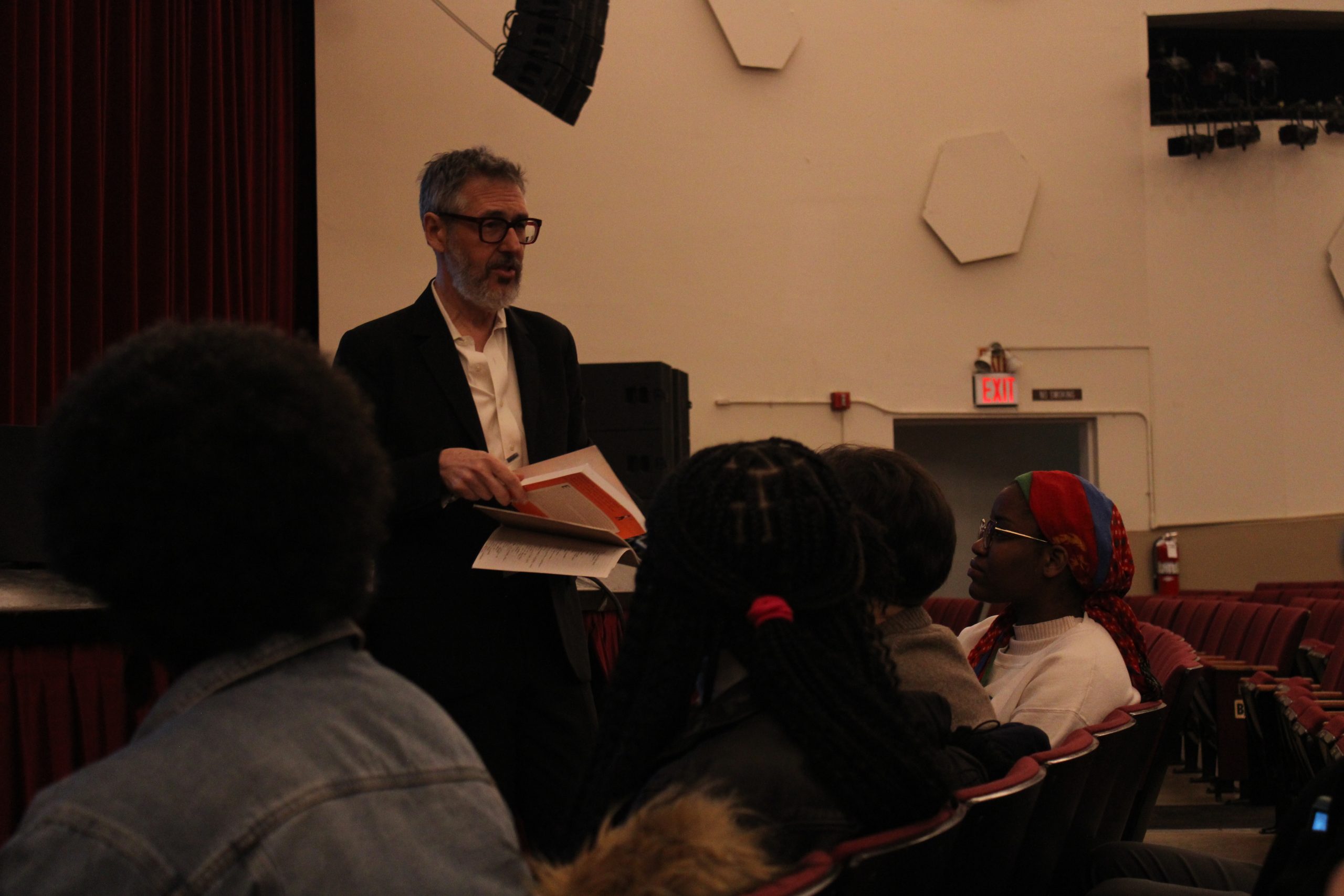You may have heard his voice during your morning commute, from your car stereo or while on the bus. If not, it’s likely that you’ve rubbed shoulders, or lanes, with someone who has. Ira Glass is the host of the iconic weekly program, This American Life, which has been captivating public radio audiences for over 25 years and now has over five million listeners worldwide. Recently, a packed auditorium with members from both the Queens College and Queens community gathered for “Seven Things I’ve Learned: An Evening with Ira Glass” at the Kupferberg Center for the Arts at Queens College on Saturday, March 11.
But, for a group of attending Queens College students and staff, Glass planned something special. As part of his contract to speak at Kupferberg Center, he spoke to students interested in media before the event; this clause was one he persisted on including in the contract. He started off the night with the students by ditching the mic, hopping off stage and asking each of us our names, who we are, and what we wish to create. Students from The Knight News, the Queens Podcast Lab, Professor Amy Herzog and WNYC’s Arun Venugopal’s podcasting course, and Professor Jason Tougaw’s podcasting course were those lucky enough to be in attendance.
For an hour before the actual event, Glass pulled back the curtain on his creative process and impressive career with wit, humanity, and tales about shark attacks and wild boars mixed live from an iPad. That’s the ethos that brings the team behind This American Life to the world of storytelling, and what brought the show six Peabody Awards and the first-ever Pulitzer Prize for ‘Audio Reporting’ given out.
It wasn’t long before attendees began to arrive. The auditorium speakers played Childish Gambino’s “This is America” on repeat until the lights dimmed. Jon Yanofsky, Director at the Kupferberg Center, began by introducing Glass as someone who ‘teased out the essential and less told.’ Yanofsky also told us that this talk would be Glass’s Queens debut.
Stepping up to the mic, Glass began humorously, saying “This is what I look like,” a subtle nod to the beard he grew that differs from his clean-shaven look on the event’s flyers.
For the next two hours, Glass covered seven things he has learned over the past 20-odd years, ranging from storytelling topics such as how to interview kids to more human lessons learned, like ‘It’s normal to be bad before you’re good.’
The range of scenes were vast, covering bedtime stories, roof-hopping to safety in a warring state, and the dramas of middle school love. Through audio and sometimes video, he took the audience through a New Jersey production plant for The Hershey Company, a mother and daughter’s bathroom mirror, and a focus group for Trump Republicans resisting the COVID-19 vaccine. In place of an intermission, he read a sobering “The Afterlife” by Billy Collins. He was charting a lot of ground.
But in the final section named “How to be Invisible,” things came together. Glass told the story of a photographer named Vivian Maier, who shot rolls of film every day for dozens of years — brilliant shots of street life — but never showed the photos to anyone. A man named John Maloof discovered the negatives and put out a book of Maier’s photos.
Would Maier have wanted Glass on stage showing everyone hundreds of her photos? Definitely not, according to the family members and close familiars his team interviewed. But, he explained that the power of her photos was in telling a personal and specific story, which is what worked for Trump voters. Glass let the audience go into the night with this message.
Despite freezing temperatures and the hour nearing midnight, attendees were open to sharing their impressions after the event, even from outside the warm Visitors Center.
Glass’s event was befitting enough for a third date according to Fausto Nunes and his date, who preferred to go unnamed; she has been ‘constantly listening’ to Glass’s work since 2008 when she was still living in China. Nunes, too, admitted to being an avid listener of This American Life for many years. When asked what it was like to see him live, he pointed to her and said, “She was the more excited one,” to which she quickly responded with laughter, “I was.” In fact, she surprised him with the tickets last minute. They arrived together from Manhattan on the back of a motorcycle.
A group of good friends, Queens College alums, spoke by the gate: Evan Ginzburg, Adam Weiss, Howard Brodsky, and Ileana Cantas. Ginzburg studied English and wrote for The Phoenix when he attended Queens College for both his Bachelor’s and Master’s.
“[When Glass said] ‘Create for yourself.’ I found that very moving because during COVID-19 I wrote a book with 100 stories that’s finally coming out,” Ginzburg said. “Many of those stories were on dear friends who passed away and family members. And I lost five people during COVID-19. So when he says, do it for yourself, it’s very cathartic, whether it’s writing or filmmaking or whatever the case may be.”
Brodsky nodded, adding on, “He’s from the heart. Everything he said was sincere. ‘This is good.’ ‘This is bad.’ He’s just calling it down the middle.” Paired off in twos, they small-talked about plans for next weekend, perhaps a local bar to hit up, then split ways down Kissena Boulevard.











